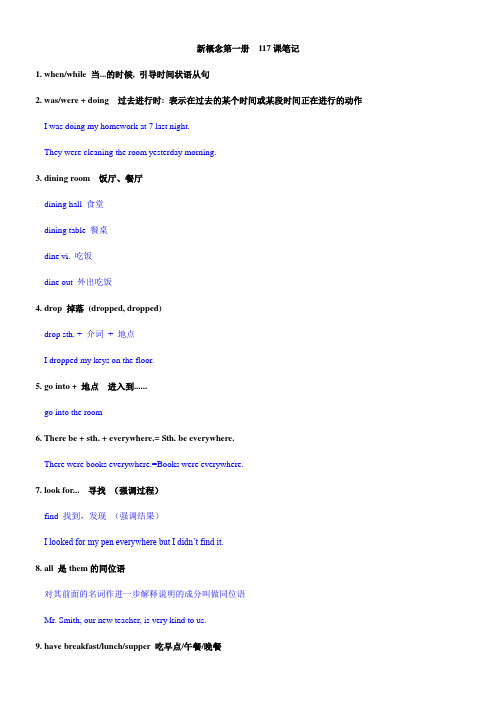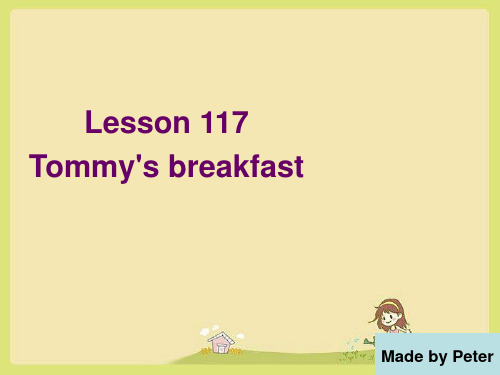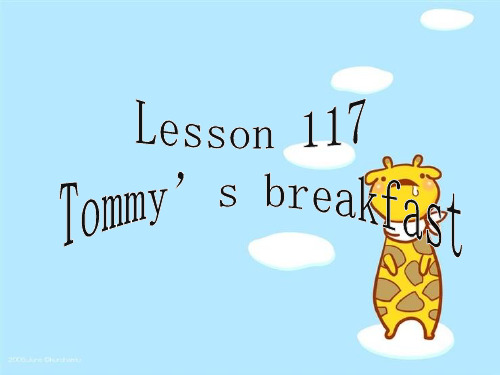新概念英语第一册117课
新概念第一册 117课笔记

新概念第一册117课笔记1. when/while 当...的时候, 引导时间状语从句2. was/were + doing 过去进行时: 表示在过去的某个时间或某段时间正在进行的动作I was doing my homework at 7 last night.They were cleaning the room yesterday morning.3. dining room 饭厅、餐厅dining hall 食堂dining table 餐桌dine vi. 吃饭dine out 外出吃饭4. drop 掉落(dropped, dropped)drop sth. + 介词+ 地点I dropped my keys on the floor.5. go into + 地点进入到......go into the room6. There be + sth. + everywhere.= Sth. be everywhere.There were books everywhere.=Books were everywhere.7. look for... 寻找(强调过程)find 找到,发现(强调结果)I looked for my pen everywhere but I didn’t find it.8. all 是them的同位语对其前面的名词作进一步解释说明的成分叫做同位语Mr. Smith, our new teacher, is very kind to us.9. have breakfast/lunch/supper 吃早点/午餐/晚餐注意:三餐前不能有冠词the10. put sth. into... 把......放进......put the books into the bag11. both 两个都(1) 放在主语后边,作同位语,表示“两者都......”We both like English.(2) both of + 人称代词(宾格)Both of them 他们两个人=They both...注意:both用于两者,all 用于三者或以上,结构同both,他们的位置通常放be动词后实义动词前12. try to do sth. 试图做某事;努力做某事try doing sth. 尝试做某事13. 过去完成时:had + done过去完成时表示过去某一时间或动作以前已经发生或完成了的动作。
新概念英语第一册自学笔记含课后练习答案:Lesson 117-118

新概念英语第一册自学笔记含课后练习答案:Lesson117-118新概念英语第一册117-118课课文重难点详解 further notes onthe text1.look for,寻找(强调动作过程);find,找到(强调寻找的结果)。
2.tommy had already swallowed them! 汤米已经把硬币咽了下去!句中用了过去完成时形式 had swallowed。
过去完成时用来表示过去两个动作中发生在前的那个动作。
显然,句中咽下硬币的动作发生在夫妇俩能够把硬币从汤米手中抢过来之前。
3.later that morning,那天上午的晚些时候。
later是副词late的比较级。
4.any changechange是个多义词,既有“零钱”的意思,也有“变化”的意思。
此处既可指“硬币”;也可指“情况的变化”。
这是双关(pun /p)n/)修辞法。
新概念英语第一册117-118课语法知识点 grammar in use过去实行时构成: be的过去式+现在分词。
过去实行时表示过去某时正在实行的情况或动作。
过去实行时和一般过去时经常在同一个句子里使用。
过去实行时表示过去正在实行的情况或动作,一般过去时则表示比较短暂的动作或事件。
过去实行时的时间状语从句一般由when,while及(just)as等来引导,说明主句中动作发生时的背景。
此外,可用 while或 at the time等强调同时实行的两种或几种动作。
请看例句:when i was doing the housework, my husband telephoned mefrom the office.当我正在干家务时,我丈夫从办公室打电话给我。
while i was listening to the stereo, my mother came into the room.我正在听立体声节目时,我母亲进房间了。
just as she was cleaning her shoes, george knocked at the door.她正在擦鞋时,乔治敲门了。
新概念英语第一册第117-118课件

Chinese Breakfast
• • • • • • • • • • • • • 油条 水饺 蒸饺 馒头 饭团 蛋饼 豆浆 稀饭 白饭 蛋炒饭 米粉 馄饨面 酸辣汤 • • • • • • • • • • • • • fried bread stick boiled dumplings steamed dumplings steamed buns rice and vegetable roll egg cakes soybean milk rice porridge plain white rice fried rice with egg rice noodles wonton & noodles hot and sour soup
Joe was reading a book. Carfield was watching TV. while When Joe was reading a book,Carfield was watching TV.
过去进行 时
Grammar
现在进行时: 构成:
主语+is/am/are +动词的现在分词(ing) 过去进行时 (8A U6)
Key words and expressions
• • • • 三天后 回头见,再见 早晚,总有一天 他比平常来得晚 • • • • three days later see you later sooner or later He came later than usual.
★
later
1) adv. 后来,较迟地,较后地 2) adj. 较迟的,较后的,更近的 in one’s later life 我们搭晚一点的火车吧。 Let’s take a later train.
新概念英语第一册117课

❖ ‘How’s Tommy?’ he asked.
❖ ‘I don’t know,’ I answered, ‘Tommy’s been to the toilet three times this morning, but I haven’t had any change yet!’
7. Mike and I___(play) basketball at that time yesterday afternoon.
课文讲解
❖ When my husband was going into the dining room this morning, he dropped some coins on the floor.
o’clock last night.
Practice Time!
1. While she ___ TV, Penny ___ asleep.
A. watches, was falling B. was watching, fell C.was watching, was falling D. watch, fell KEY: B
❖ As the children were playing in the garden, it began to rain.
❖ He put them both into his mouth. We both tried to get the coins. But it was too late. Tommy had already swallowed them!
I was having dinner when he came in.
新概念英语NCE1_lesson117-118(共18页)课件

单词学习
• dinning room(hall) • coin • mouth • swallow • later • toilet
饭厅 n. 硬币 n. 嘴 v. 吞下 adv. 后来 n. 厕所,盥洗室
• coin n. 硬币 • a silver coin 银币 • 你能把这个一美元的纸币换成硬币吗? • Could you change the one-dollar bill into coin? • mouth n. 嘴 • Open your mouth. • 嘴里塞满食物时不要说话。 • Don’t talk with your mouth full! • It sounds funny in your mouth. • 这种话由你的口中说出来,听起来就很可笑。
• later • 1) adv. 后来,较迟地,较后地 • 回头见
• see you later. • 三天后
• t得晚。
• He came later than usual. • 2)adj. 较迟的,较后的,更近的。 • 我们搭晚一点的火车吧。
• Let’s take a later train.
• swallow • ① v. 吞下,咽下
• Tommy swallowed the coins. • ② v. 抑制,使不流露
• I tried hard to swallow my doubts. • 我强忍着不露出怀疑的神色。 • 她忍住没笑,静静地坐在那里。
• She swallowed a smile and sat there still. • ③ v. 吞并;侵吞 • 我们公司去年被一家美国公司吞并了。
新概念英语第一册Lesson117-118笔记(语法点+配套练习+答案)

put ... into ...
把...放到
have/has been to
曾去过某地
四、语法解析
1.现在进行时:说话此刻正在发生
结构:be (am/is/are) + v.ing
时间标志词:Look! Listen! now, at the moment
练习:
1.One of themis taking(take) photos for us now.
11.Didyoufinish(finish) your homework yesterday?
12.Her motherdidn’t give(not give) the girl any present.
13.When hewent(go) back to England, hewass(be) very tired.
The childrenwereallhappy.
Bothof the twins wanted to go to the theatre.
Allof my classmates are invited to my party.
three times三次
现在完成时的标志词
twice两次
once一次
have/has been to去过某地,已回
have/has gone to去了某地,未回
My father isn't at home, hehas gone toBeijing.
Mr Wang isn't here.Hehas gone toQingdao.
My fatherhas been toBeijing twice.
Ihaveneverbeen tothe Great Wall.
新概念英语第1册117课

JIM:Look! Everyone's in the garden. CAROL:Hello, Helen. Hello, Jim. TOM:Everybody wants to have lunch in the garden.
It's nice and warm out here. CAROL:Come and have something to drink. JIM:Thanks, Carol. May I have a glass of beer
• dining room
• coin
n.
• mouth
n.
• swallow v.
• later
adv.
• toilet
n.• ring源自v.饭厅 硬币 嘴 吞下 后来 厕所 响
Key words&expressions
★ coin n. 硬币 (note 纸币)
toss a coin
★ 掷硬币(打赌正面或反面)
dining room toilet
mouth
coin ring
swallow later
toilet coin swallow
later
Questions on the text
• What does she mean by ‘change’ in the last sentence?
Video
Key words&expressions
★ later
1) adv. 后来,较迟地,较后地 • three days later 三天后 • He came later than usually.他比平常来得晚。 • See you later. 回头见,再见。 • sooner or later 早晚,总有一天
新概念英语第一册117课 课件(共17张PPT)

• 5. The train left when I was buying the tickets.
• 6. It rained heavily when I was driving to London.
A. is having B. have C. has D. was having
4. What ____ you ____from 7 to 9 yesterday ? A. were, doing B. did. do C. have, done
5.Look! Lily with her sister __ a kite on the playground.
shaving
cut
Exercise P239
• 1. He knocked at the door when I was answering the phone.
• 2. He came downstairs when I was having breakfast.
• 3. The phone rang when I was washing the dishes.
过去进行时VS现在进行时
结构
现在am/is/are+v-ing 过去was/were+v-ing
The students are drawing pictures now.
The students were drawing pictures when the teacher came in.
3.时间状语:
New words and expressions
dining room
- 1、下载文档前请自行甄别文档内容的完整性,平台不提供额外的编辑、内容补充、找答案等附加服务。
- 2、"仅部分预览"的文档,不可在线预览部分如存在完整性等问题,可反馈申请退款(可完整预览的文档不适用该条件!)。
- 3、如文档侵犯您的权益,请联系客服反馈,我们会尽快为您处理(人工客服工作时间:9:00-18:30)。
沧海一粟;九牛一毛。
Time for listening!
❖ 概念:
1、在过去某个特定的时间正在进 行或发生的动作。
2、当过去的一个动作发生的时候 另外一个动作正在进行。
❖ 结构 1、肯定句:主语+was/were + 现在
分词
I was having breakfast. 2、否定句:主语+was/were not +现
4. I ___ (telephone) a friend when Bob ___ (come) in.
5. While mother ___(put)
Cathy to bed, the door bell ___
(ring).
6. Jane___(wait) for me when I___(arrive).
嘴里塞满食物时不要说话。
❖ swallow v. ① v. 吞下,咽下
Tommy swallowed the coins.
② v. 吞并;侵吞
Our company was swallowed up by an company last year.
我们公司去年被一家美国公司吞并了。
American
❖ later 1) adv. 后来,较迟地,较后地 e.g. three days later 三天后
I was having dinner when he came in.
He came in when I was having dinner
While I was having dinner, he came in.
Mom was reading while Dad was watching ቤተ መጻሕፍቲ ባይዱV.
New concept English 1
Lesson 117
Tommy's breakfast 汤米的早餐
New words and expressions
❖ dinning room
❖ coin
n.
❖ mouth
n.
❖ swallow v.
❖ later
adv.
❖ toilet
n.
饭厅 硬币 嘴 吞下 后来 厕所,换洗室
❖ 过去进行时与一般过去时 ❖ 过去进行时强调过程,不一定完成 ❖ 一般过去时强调事件,一定完成 ❖ I went to school yesterday. ❖ I was going to school at that time. ❖ Tom did his homework last week. ❖ Tom was doing his homework at nine
7. Mike and I___(play) basketball at that time yesterday afternoon.
课文讲解
❖ When my husband was going into the dining room this morning, he dropped some coins on the floor.
在分词
They were not watching TV. 3、疑问句:was/were + 主语+ 现在
分词
Was he writing a letter last night?
❖ 常用时间状语
When, while, a moment ago, from nine to ten last evening, at that time ❖ when既指时间点,也可指一段时间, while只指 一段时间,因此when引导的时间状语从句中 的动词可以是终止性动词,也可以是延续性动 词,而while从句中的动词必须是延续性动词。
o’clock last night.
Practice Time!
1. While she ___ TV, Penny ___ asleep.
A. watches, was falling B. was watching, fell C.was watching, was falling D. watch, fell KEY: B
❖ 此句是过去进行时,结构是was/ were+ doing 表 示过去某个时刻正在进行或发生的动作。
❖ go into 走进,强调“进入”的动作 ❖ 反义词 go out of 走出… ❖ drop 掉下 ❖ 小心,别把花瓶摔了。
Be careful! Don’t drop the vase. ❖ drop 还可以表示丢失,丢掉 ❖ 回家的路上,我把等弄丢了。
❖ There were coins everywhere. We looked for them, but we could not find them all.
❖ everywhere 到处 ❖ look for 寻找(强调动作和过程) ❖ find 找到 (强调寻找的结果) ❖ 我找遍了任何地方都找不到我的钢笔。
e.g. He came later than usual. 他比平常来得晚。
2)adj. 较迟的,较后的,更近的。 e.g. Let’s take a later train. 我们搭晚一点的火车吧。
❖ drop v. (意外)掉落;使掉落 e.g. A drop in the bucket/ocean.
Dining room(hall) 饭厅
Living room
起居室,客厅
Bedroom 卧室
Bathroom
洗浴室,卫生间
Kitchen
厨房
❖coin n. 硬币(可数名词)
e.g. Every coin has two sides.
每个事物都有两面性。
❖ mouth n. 嘴
e.g. Don’t talk with your mouth full!
2. Penny __ dinner when she cut her fingers.
A. had B. having C. was having D. is having KEY: C
3. While we ___ (wait) for the bus, a girl ___(run) up to us.
